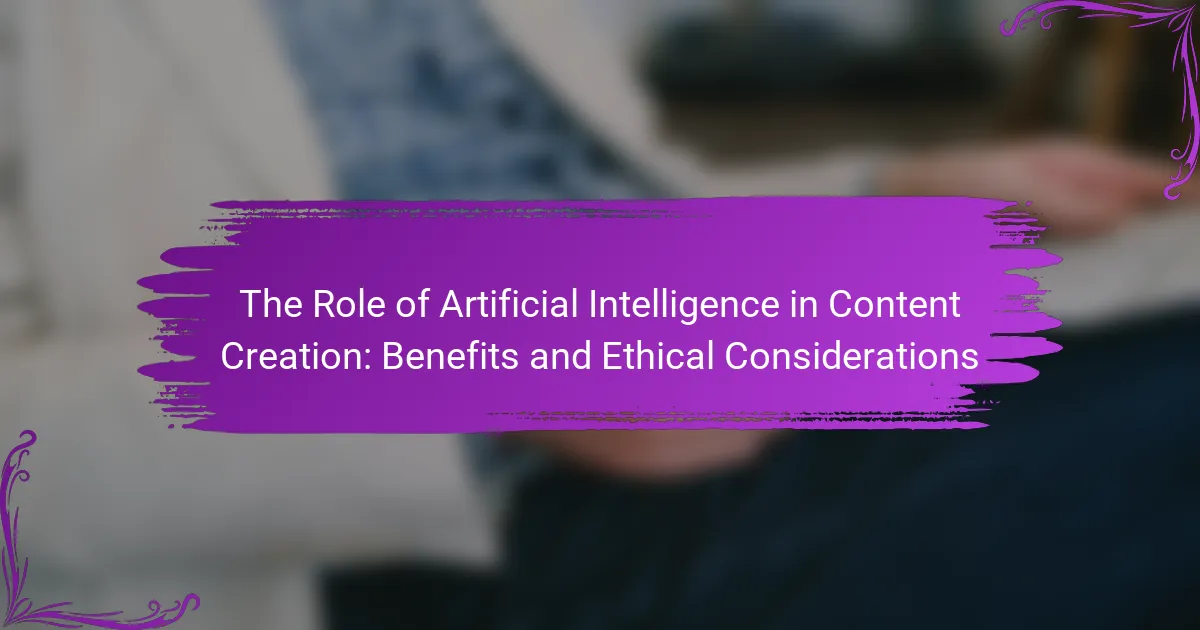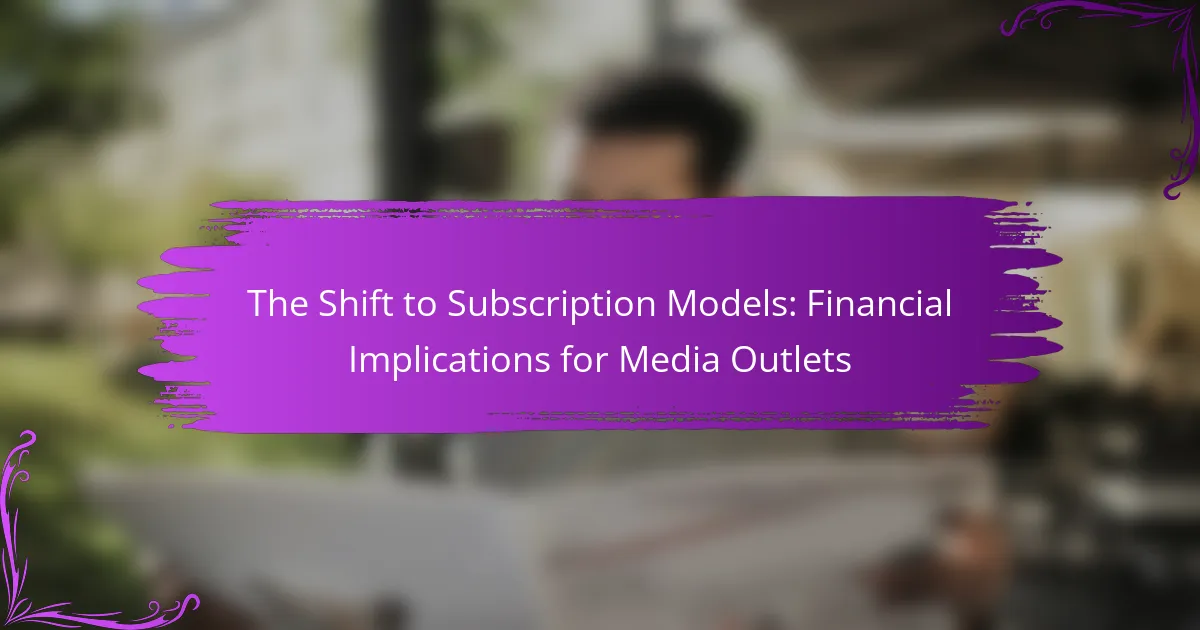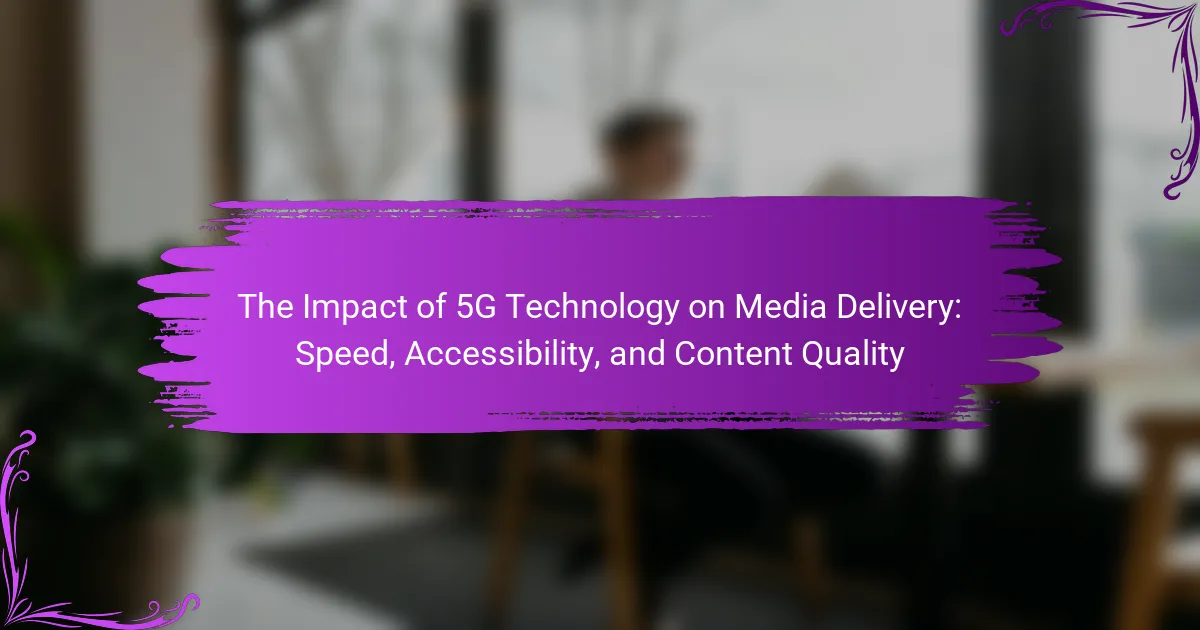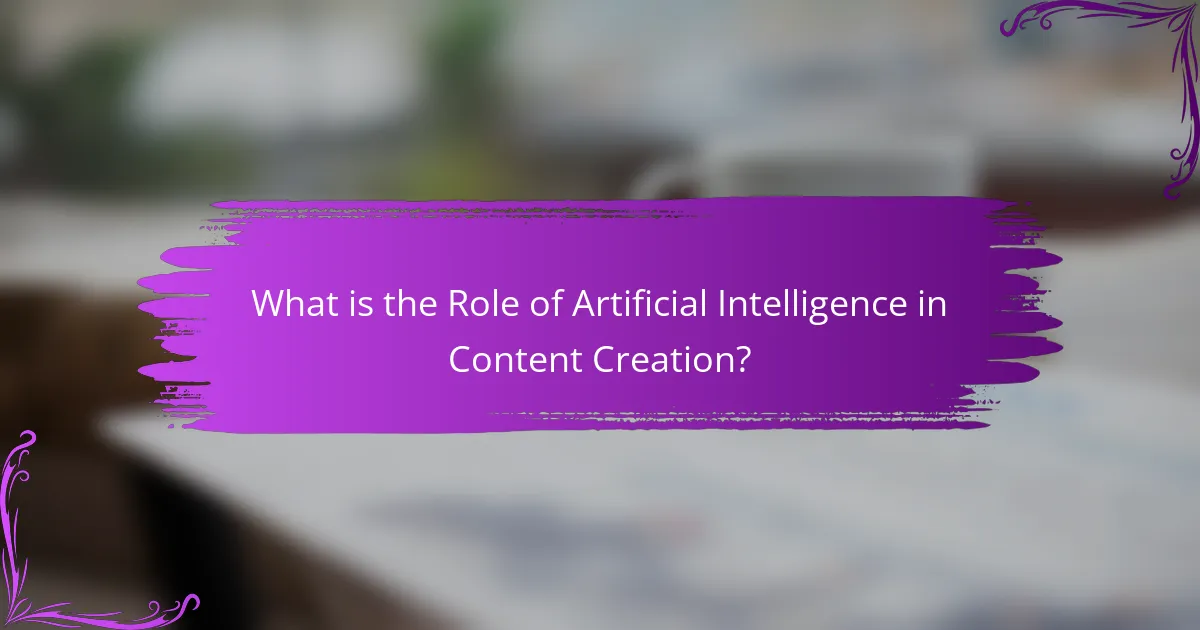
What is the Role of Artificial Intelligence in Content Creation?
Artificial Intelligence plays a significant role in content creation by automating processes and enhancing creativity. AI tools can generate text, images, and videos quickly and efficiently. For instance, natural language processing algorithms can produce articles based on given prompts. Additionally, AI can analyze data to tailor content to specific audiences. This personalization increases engagement and relevance. Research shows that AI-generated content can improve productivity by up to 50%. Furthermore, AI assists in optimizing content for search engines, increasing visibility. Overall, AI streamlines content creation while maintaining quality and relevance.
How is Artificial Intelligence transforming the content creation process?
Artificial Intelligence is transforming the content creation process by automating tasks and enhancing creativity. AI tools can generate written content, analyze trends, and optimize SEO strategies. For instance, platforms like OpenAI’s GPT-3 can produce articles and marketing copy quickly. This reduces the time spent on drafting and editing. AI algorithms can also analyze audience behavior to tailor content more effectively. According to a study by McKinsey, AI can increase productivity in content creation by 20-30%. Additionally, AI assists in personalized content delivery, improving user engagement. These advancements demonstrate AI’s significant impact on efficiency and creativity in content creation.
What technologies underpin AI’s capabilities in content creation?
AI’s capabilities in content creation are underpinned by several key technologies. Natural Language Processing (NLP) allows machines to understand and generate human language. Machine Learning (ML) algorithms enable systems to learn from data and improve over time. Deep Learning, a subset of ML, utilizes neural networks to process large amounts of information. Generative Adversarial Networks (GANs) create new content by pitting two neural networks against each other. These technologies work together to enhance the quality and relevance of generated content. For instance, OpenAI’s GPT-3 demonstrates advanced NLP and deep learning capabilities in producing coherent text.
How do AI tools enhance creativity and efficiency in content generation?
AI tools enhance creativity and efficiency in content generation by automating repetitive tasks and providing innovative suggestions. These tools analyze vast amounts of data to generate ideas and content structures quickly. They can produce drafts, headlines, and even complete articles in a fraction of the time it takes a human. For instance, AI algorithms can identify trending topics, ensuring content relevance. Additionally, they assist in optimizing content for SEO, improving visibility. According to a study by McKinsey, companies that utilize AI in content creation can increase productivity by up to 40%. This demonstrates the significant impact of AI tools on both creativity and efficiency in the content generation process.
What are the key benefits of using Artificial Intelligence in Content Creation?
Artificial Intelligence offers several key benefits in content creation. Firstly, it enhances efficiency by automating repetitive tasks. This allows content creators to focus on more strategic elements of their work. Secondly, AI provides data-driven insights that help tailor content to target audiences. Personalization increases engagement and improves user experience. Thirdly, AI tools can generate content quickly, enabling faster production cycles. For instance, platforms like OpenAI’s GPT-3 can produce high-quality text in a matter of seconds. Additionally, AI assists in optimizing content for search engines, improving visibility and reach. Finally, AI can analyze performance metrics, allowing for continuous improvement of content strategies. These benefits demonstrate the transformative impact of AI on the content creation process.
How does AI improve content personalization for audiences?
AI improves content personalization for audiences by analyzing user data to tailor experiences. It utilizes algorithms to assess preferences, behavior, and demographics. This data-driven approach enables AI to recommend relevant content. For example, streaming services use AI to suggest shows based on viewing history. Research shows that personalized content can increase engagement by up to 80%. Additionally, AI can adapt content in real-time, enhancing user satisfaction. By continuously learning from interactions, AI refines its recommendations over time. This leads to a more relevant and engaging user experience.
What cost savings can be achieved through AI-driven content strategies?
AI-driven content strategies can achieve significant cost savings by automating content creation and reducing labor expenses. Automation allows for faster content production, which can lower operational costs. Businesses can produce high-quality content at a fraction of the cost compared to traditional methods. For example, AI tools can generate articles, social media posts, and marketing materials quickly. This efficiency reduces the need for large content teams, leading to lower payroll expenses. Additionally, AI can analyze data to optimize content for better engagement, resulting in higher returns on investment. According to a report by McKinsey, companies that adopt AI can reduce content production costs by up to 30%.
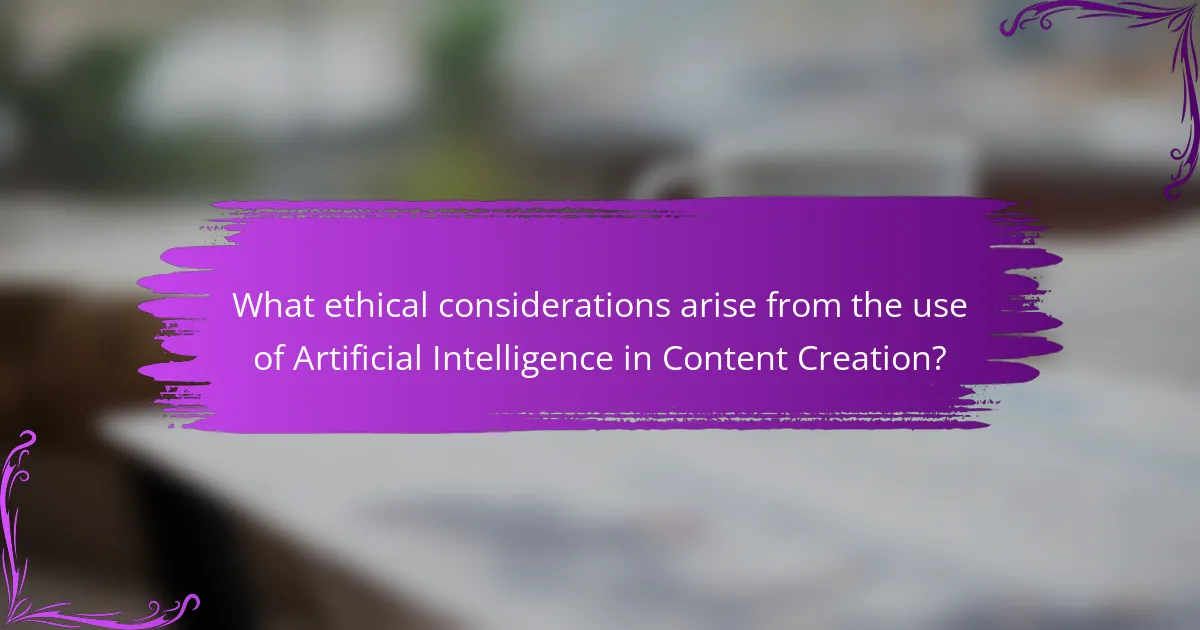
What ethical considerations arise from the use of Artificial Intelligence in Content Creation?
Ethical considerations in the use of Artificial Intelligence in content creation include issues of plagiarism, bias, and transparency. Plagiarism occurs when AI generates content that closely resembles existing works without proper attribution. Bias in AI systems can lead to the perpetuation of stereotypes or misinformation. Transparency is crucial, as users should be informed when content is generated by AI. According to a 2021 study by the Pew Research Center, 72% of experts believe that AI-generated content could mislead audiences. These considerations highlight the need for ethical guidelines in AI content creation.
How does AI impact copyright and intellectual property in content creation?
AI impacts copyright and intellectual property by complicating ownership and authorship issues. Traditional copyright laws typically protect original works created by human authors. However, AI-generated content raises questions about who owns the rights. In many jurisdictions, AI lacks legal personhood, making it unclear if the creator of the AI or the user of the AI holds copyright.
This ambiguity can lead to disputes over the use of AI-generated works. For example, if an AI generates a painting, the question arises: is the programmer, the user, or the AI itself the author? Additionally, AI tools often learn from existing copyrighted materials, which may infringe on the rights of original creators.
Courts are beginning to address these issues, but no consensus exists. A notable case is the U.S. Copyright Office’s decision to deny copyright for a work created solely by AI. This highlights the evolving landscape of copyright law in relation to AI. As AI technology advances, ongoing legal discussions will shape the future of intellectual property rights.
What are the risks of misinformation associated with AI-generated content?
Misinformation associated with AI-generated content poses significant risks. AI can produce content that appears credible but is factually incorrect. This can lead to the spread of false narratives or harmful stereotypes. The rapid dissemination of AI content on social media amplifies these issues. A study by MIT found that false news spreads six times faster than true news on Twitter. Additionally, AI lacks the ability to discern context or verify facts, increasing the likelihood of errors. Users may trust AI-generated information without critical evaluation. This trust can perpetuate misinformation and erode public confidence in reliable sources.
How can transparency be maintained in AI-generated content?
Transparency in AI-generated content can be maintained through clear labeling and disclosure of AI involvement. This involves explicitly stating when content is generated or assisted by AI technology. Providing information about the AI tools used can further enhance transparency. Additionally, offering access to the underlying data or algorithms can build trust. Regular audits of AI systems can ensure adherence to ethical standards. Transparency fosters accountability and helps users understand the content’s origin. Studies indicate that transparency in AI can improve user trust and engagement.
What are the societal implications of AI in content creation?
AI in content creation has significant societal implications. It influences job displacement in traditional writing and media roles. Many content creators may find their skills less in demand. AI can enhance productivity but may also lead to homogenization of content. The diversity of voices may diminish as algorithms favor popular trends. Ethical concerns arise regarding misinformation and bias in generated content. AI systems can perpetuate existing biases present in training data. Additionally, there are concerns about copyright and ownership of AI-generated works. These implications necessitate careful regulation and ethical guidelines in AI development.
How does AI influence the job market for content creators?
AI significantly influences the job market for content creators by automating repetitive tasks and enhancing creativity. Automation allows AI to handle data analysis, content scheduling, and basic writing. This reduces the workload for content creators, enabling them to focus on higher-level creative tasks. AI tools can generate content ideas and optimize SEO, improving content visibility. According to a 2021 report by McKinsey, AI could increase productivity in content creation by up to 40%. However, this shift also raises concerns about job displacement. Some entry-level positions may decline, while demand for skilled creators who can leverage AI tools is likely to grow. Thus, the job market is evolving, favoring those who adapt to AI technologies.
What measures can be taken to ensure ethical AI use in content creation?
Implementing ethical AI in content creation requires several key measures. Establishing clear guidelines for AI usage is essential. These guidelines should focus on transparency and accountability. Regular audits of AI systems can help ensure compliance with these guidelines. Training AI models on diverse and representative datasets is crucial. This practice reduces bias and enhances inclusivity in content generation. Additionally, obtaining informed consent from users is important when utilizing their data. Continuous monitoring of AI outputs can identify and mitigate potential ethical issues. Engaging stakeholders in discussions about AI ethics fosters a collaborative approach. These measures collectively promote responsible AI practices in content creation.
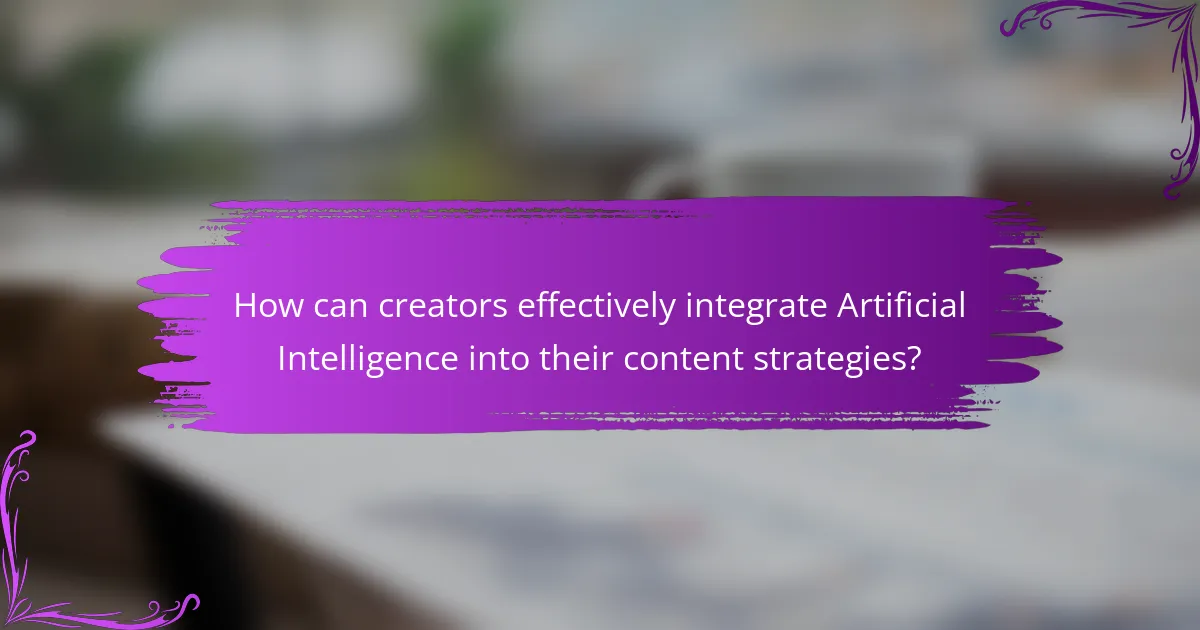
How can creators effectively integrate Artificial Intelligence into their content strategies?
Creators can effectively integrate Artificial Intelligence into their content strategies by utilizing AI tools for content generation, optimization, and analysis. AI can streamline the content creation process by automating repetitive tasks. For instance, tools like GPT-3 can generate written content based on prompts. This allows creators to focus on higher-level strategy and creativity.
Moreover, AI can analyze audience data to tailor content to specific demographics. By using machine learning algorithms, creators can identify trends and preferences. This data-driven approach enhances engagement and improves content relevance.
Additionally, AI can assist in optimizing content for search engines. Tools like Clearscope or MarketMuse provide insights on keyword usage and content structure. This ensures that content is not only engaging but also discoverable.
Furthermore, AI can enhance personalization in content delivery. By leveraging user data, creators can deliver tailored experiences that resonate with individual users. This increases retention and fosters loyalty.
In summary, integrating AI into content strategies enhances efficiency, personalization, and engagement. The ability to analyze data and automate processes positions creators to meet audience needs effectively.
What best practices should be followed when using AI tools for content creation?
Utilizing AI tools for content creation requires adherence to best practices to ensure quality and ethical standards. First, define clear objectives for the content. This helps guide the AI in generating relevant material. Next, provide high-quality input data. The output quality directly correlates with the input quality. Regularly review and edit AI-generated content. Human oversight is essential for accuracy and tone. Use AI as a supplement, not a replacement. Collaboration between human creativity and AI efficiency yields the best results. Lastly, be transparent about AI usage. Disclosing AI involvement builds trust with the audience. Following these practices enhances the effectiveness of AI tools in content creation.
How can creators balance human creativity with AI technology?
Creators can balance human creativity with AI technology by integrating AI tools as supportive resources rather than replacements. AI can assist in generating ideas, streamlining workflows, and enhancing productivity. For instance, AI algorithms can analyze trends and suggest content themes. This allows creators to focus on the unique aspects of their work. Moreover, maintaining a human touch in storytelling and emotional engagement is crucial. Studies show that audiences prefer content that resonates on a personal level. By leveraging AI for efficiency while prioritizing authentic human expression, creators can achieve a harmonious balance.
What resources are available for learning about AI in content creation?
Online courses, books, and research papers are available for learning about AI in content creation. Websites like Coursera and Udemy offer courses on AI applications in writing. Books such as “Artificial Intelligence for Content Creators” provide in-depth insights. Research papers from journals like the Journal of Artificial Intelligence Research discuss AI’s impact on content. Additionally, platforms like Medium feature articles on AI trends in content creation. These resources collectively enhance understanding of AI’s role in the industry.
What are the future trends of Artificial Intelligence in Content Creation?
Future trends of Artificial Intelligence in content creation include increased automation and personalization. AI tools will generate content with minimal human intervention. Natural language processing will enhance the quality of written content. Predictive analytics will tailor content to specific audience preferences. Real-time data analysis will inform content strategies more effectively. AI will facilitate multimedia content creation, such as videos and graphics. Collaboration between AI and human creators will become more common. Ethical considerations will shape AI development, focusing on transparency and bias reduction. These trends reflect the evolving landscape of content creation driven by AI advancements.
How will advancements in AI shape the future of content marketing?
Advancements in AI will significantly enhance content marketing by automating processes and personalizing experiences. AI tools can analyze consumer behavior and preferences at scale. This data allows marketers to create targeted content that resonates with specific audiences. For example, AI-driven analytics can predict trends and optimize content strategies. Natural language processing enables the generation of high-quality content quickly. Additionally, AI can streamline content distribution across various channels. According to a report by Gartner, 80% of marketers will use AI for content creation by 2025. This shift will lead to increased efficiency and improved engagement in content marketing strategies.
What emerging technologies should content creators be aware of?
Content creators should be aware of artificial intelligence, augmented reality, and blockchain technology. Artificial intelligence enhances content creation through automation and personalization. Tools like AI-driven writing assistants and image generators streamline workflows. Augmented reality provides immersive experiences for audiences, making content more engaging. Platforms like Snapchat and Instagram utilize AR filters to enhance user interaction. Blockchain technology offers transparency and security in content ownership and distribution. It allows creators to manage copyrights effectively through smart contracts. These technologies are shaping the future of content creation by improving efficiency and audience engagement.
The main entity of this article is Artificial Intelligence (AI) in the context of content creation. The article explores the significant role AI plays in automating processes, enhancing creativity, and personalizing content for specific audiences, ultimately improving efficiency and productivity. Key topics include the technologies that enable AI capabilities, the benefits of using AI in content strategies, ethical considerations such as plagiarism and bias, and the future trends shaping content marketing. Additionally, it addresses the societal implications of AI on job markets and the importance of maintaining transparency in AI-generated content.
